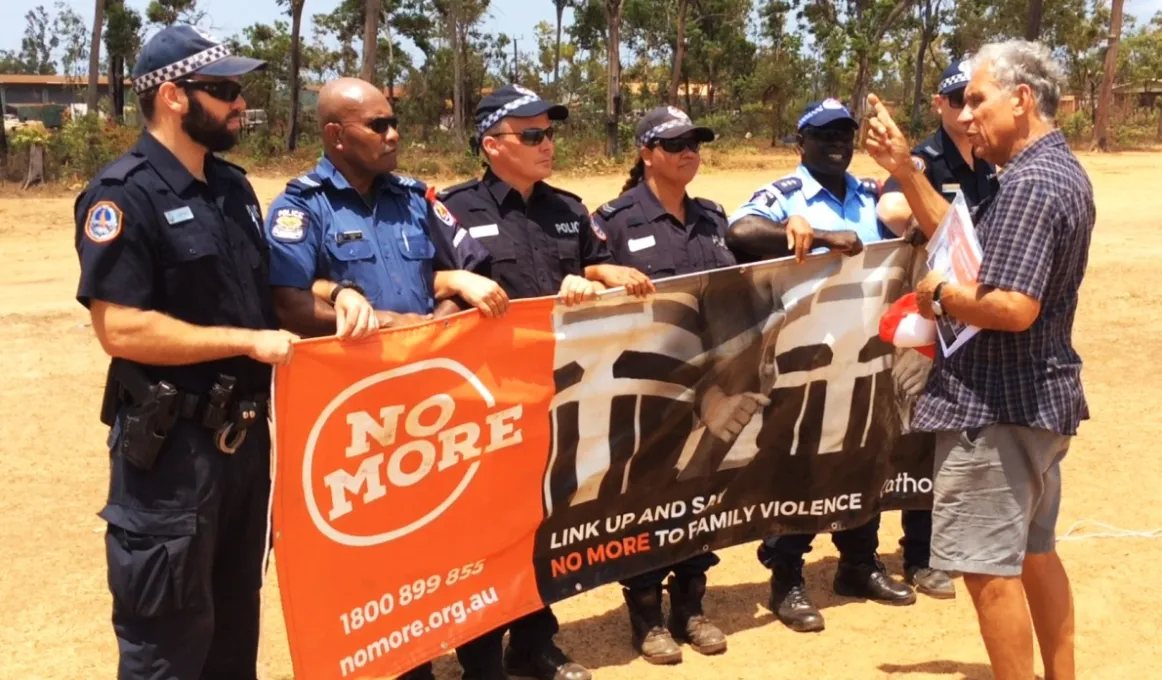NO MORE say the men of Ramingining

The NO MORE campaign seeks to promote awareness of family violence and encourage men, in particular, to link arms to take action to reduce violence. The men of Ramingining in Arnhem Land are leading the way by saying “NO MORE” to domestic violence.
Sadly, domestic violence remains at unacceptably high levels around Australia. So, it was inspiring to see the men of Arnhem Land’s Ramingining unite to say NO MORE to violence.
The NO MORE campaign seeks to promote awareness of family violence and encourage men, in particular, to link arms to take action to reduce violence. The issue of domestic violence is one that many Ramingining men take very seriously, and they welcomed popular ABC Radio announcer, White Ribbon ambassador and NO MORE campaign founder Charlie King to the community to officially open the NO MORE campaign there.
Thanking the community for welcoming him onto their country, Charlie spoke to community members about respect; that being strong means looking after each other and most importantly respecting ourselves enough to not act violently.
In the lead up to the visit, the community worked closely with NT Police, the East Arnhem Shire Council, AFLNT, Ramingining School and government and non-government organisations to ensure the success of the launch.
Local Community Engagement Police Officer (CEPO) Constable Paul Keightley and Youth Mentor for East Arnhem Shire Council Will Gee saw the importance of getting Charlie and his NO MORE campaign into the community.
“There is no place for domestic violence in the Northern Territory,” Constable Keightley said.
Having Charlie here to launch NO MORE and reinforce key messages about respectful relationships is wonderful and contributes to success in the community,” he said.
lice Officer Constable Paul Keightley said, “There is no place for domestic violence in the Northern Territory and having Charlie here to launch NO MORE and reinforce key messages about respectful relationships is wonderful and contributes to success in the community."
The formal proceedings finished with the linking of arms and chanting “No More Violence” which could be heard throughout the community.
While in Ramingining Charlie worked with AFLNT Regional Programs Manager Ian Brown to develop a committee to oversee Raminingining Football Club’s plans to oppose domestic violence and reinforce important safety messages for the community. Meanwhile, the police broke off with the kids and kicked the footy while the visiting Royal Papua New Guinea Constabulary chatted to community members about the similar issues they face and the importance of education in their community.
Most importantly, the community recognised that Ramingining will only become safer and more resilient when everyone is working together.
Find out more
Domestic violence affects women in every suburb, town and community in Australia. As a result, the Australian Government has announced a $100 million Women’s Safety Package focusing on practical immediate action to keep women and their children safe. This includes $21 million committed to specific measures that will help Indigenous women and communities, who experience domestic and family violence at rates significantly higher than the non-Indigenous population.
Additionally, the Australian Government is jointly funding with states and territories a $30 million national campaign to change young people’s attitudes to violence.
The NO MORE campaign works with communities to placing the responsibility of reducing family violence on men, the most common perpetrators.